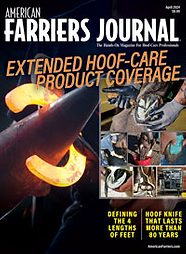I often receive emails from writers who are looking for more information on the farrier industry. Typically the writer is affiliated with an equine publication and wants to interview a farrier on a hoof-care topic. The other day a reporter representing the American Association of Retired Persons (AARP) wrote to me for help a story on “great jobs with not-so-great pay.” The AARP-owned website that will run the article is dedicated to midlife career changes.
Farriery is a “great” job, with many enriching qualities. But it is inaccurate to generalize the trade as one that is enriching in personal fulfillment, but not financial.
Certainly, many hoof-care providers are having a tough time making ends meet due to financial issues that are beyond their control, including regional economics, clients who stretch out appointments/don’t pay and not enough owners in one area to support a footcare practice. Also, it is uncommon for those starting out in the industry to immediately attain financial comfort.
However, “not-so-great pay” often rests with the business proprietor. Is that farrier doing all he/she can do to advance a practice? Is the knowledge and skill high enough to help horses maintain soundness or overcome lameness issues? Is the farrier promoting his/her business in the local area? Does that farrier return phone calls and take time to answer client questions? Does that farrier invest in continuing education? Does the farrier properly manage business expenses and track income? Does that farrier associate with other farriers at supply shops, clinics, association meetings and other venues?
The “tough” work in farriery isn’t only being under a horse — it is difficult to wear the additional hats of your practice’s marketer, accountant, customer service agent and so on. Financial gain in a farrier practice is impossible to attain if the sole focus is the horse’s feet, while ignoring these other areas.
I doubt many enter the industry expecting financial gain. Instead, most are attracted to the freedom and work that directly impacts the health of other living beings.
But that freedom is defined by much more than setting your own hours or choosing the clients you work for. Freedom for a farrier means you dictate whether you’ll reach your full potential as a professional. And if you exercise that freedom, invest time and aren’t hampered by those conditions beyond your control, it will be a financially rewarding career as well.








Post a comment
Report Abusive Comment